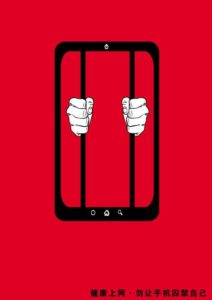Smartphone Addiction in China: Can Media Advertisements Rescue Chinese “Phubbers”?
Smartphone Addiction in China: With the second highest average time spent using smartphones, China is looking to advertising to solve this addiction to technology.
Is smartphone addiction curable?
Young Chinese have become some of the worst offenders of phubbing (a new word that combines phone and snubbing). This is mainly due to China’s high levels of average phone use per day; which is dramatically higher than other countries.In 2015, TNS carried out a study which showed that among Chinese users aged 16-30, the average time of phone use was 3.9 hours, compared to the world’s average 3.2 hours, ranking second only after Thailand.
Since 2014, many advertisements aiming to tackle smartphone addiction in China have started to appear. A print campaign that is currently visible in the subway invites Chinese citizens to “put down their phones, stop phubbing, raise their heads to look around and not to let their phones kidnap their real lives.” This ad, designed by a Xi’an based agency, won the bronze prize in 2016’s China Public Service Advertisement Grand Prix (2016中国公益广告黄河奖). A research done on 2000 Chinese subjects by Deloitte in 2015, over 78% of the subjects checked their smartphones more than 11 times per day (58% for more than 11 times, 20% for more than 50 times.) Since smartphone addiction has recently become a serious and extensive problem in China, many public service advertisements have started to concern themselves with this issue in recent years.

“Do not be kidnapped by the mobile phone.” This campaign, launched by a Xi’an-based agency, won the bronze prize in 2016’s China Public Service Advertisement Grand Prix (2016中国公益广告黄河奖)
Smartphone addiction in China – A spreading disease
Data shows that for the young people in China, smartphone addiction has become a chronic and widely-extending disease. According to a 2016 survey from Tencent, among citizens aged 28-37, 94% are not used to going out without their mobile phones, 84% will feel anxious if their phones fail to connect to the internet, and 73% check a social app at least once every 15 minutes. These symptoms show that young Chinese are finding it increasingly difficult to live without their smartphones. They are overly dependent on the convenience and fun provided by them.

“Be a healthy netizen, do not let the smartphone imprison you”: An advertisement campaign showed on CCTV.com, which was in a 2015 advertising competition named ‘Chinese good netizens’(中国好网民)
According to research done by Daxue Consulting in 2015, Chinese aged 18-27 used mobile phones for an average of 4 hours every day. Meanwhile, CASS (中国社会科学院Chinese Academy of Social Sciences) said that university students used mobile phones for 5 hours every day, which accounts for 22% of the whole day.
In this situation, many public media outlets have feverishly covered this hot topic, to arouse phubber’s consciousness of controlling themselves from a compulsive reliance on smartphones. A series of print advertisements have been exhibited to bring more awareness to this issue.

“Listening to music, watching the news, reading celebrities’ gossips, using Weibo, chatting on QQ, watching videos, reading e-books, taking photos, shooting videos, browsing Taobao, using the ‘shake’ function of WeChat, checking WeChat moments, sending messages, observing the stock market, playing mobile games…Do not let your phone kidnap you. Put down your phone!” This campaign won the Silver Prize in a 2015 competition launched by CCTV.
Mainstream media aims to solve this crisis
In addition to print or outdoor advertisements, some mainstream TV networks have also covered this phenomenon. Through a series of video advertisements, the largest State-owned TV station, CCTV has taken the responsibility of warning people about the harm of this ‘digitally derived rudeness.’ The issue comes from millennials checking their phones on nearly every occasion while ignoring friends or families around them.

‘Smartphones imprison our sights’: A 2015 video advertisement on XNTV (新疆网络电视台), a TV station in Xinjiang province, won the bronze prize in a competition launched by CCTV.
Along with print and video advertisements, radio broadcasting networks have also joined this public service announcement. A typical example is CNR-1 (China National Radio 中国之声, a radio station owned by the Chinese government). They broadcasted an advertisement urging people to get rid of their dependence on smartphones. The slogan said ‘Put down your phone to see the beautiful around; shutdown the phone to give your family a smile; get away from Weibo to say “I love you” to your partners; stop refreshing the screen to chat with your parents’.
This smartphone addiction phenomenon has also attracted the attention of some commercial advertisements. China Lane (宽窄巷子), a tourist attraction in Chengdu, has publicized an outdoor advertisement based on the concept of phubbing, in order to promote itself.


“Put down your phone”: A2015 outdoor advertisement of Chengdu China Lane (宽窄巷子).
Words on the right: “Drinking coffee together in China Lane instead of giving a like to your friend on WeChat.”
Words on the left: “Do not be busy connecting to WIFI while ignoring the special landscape in China Lane.”
Time will tell if adverts found success
Through the efforts of these various advertisements, smartphone addiction is arousing increasing attention. In 2016, the Baidu Media Index on the word phubbing has sharply risen. On Zhihu (知乎), many netizens asked about the method to withdraw from this bad habit.On Weibo, a topic on ‘smartphone addiction’ attracted 13 million views and 4,300 hot discussions. Some celebrities also recognized this problem. Kai-Fu Lee (李开复), the previous president of Google Greater China, posted a Weibo in 2015, calling on people to care for the people around them instead of being obsessed with their phones.
But can the young easily get rid of this digital drug? Many have been persuaded and finally decided to break this habit, but with smartphones providing unprecedented convenience and fun, the future remains uncertain.With global data from Flurry, the number of people addicted to their smartphone all over the world increased over 50%. With continued data analysis by Daxue Consulting concerning the use of smartphones in China, as well as a variety of media advertisements targeting these users, the future rise or fall of phubbers remains to be seen.
To know more about Smartphone addiction in China, please don’t hesitate to contact us.
Stay Up To Date! Sign up for our Newsletter to Receive the Last Updates.















